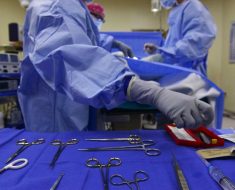Chinese researchers reporting at the 2022 Gastrointestinal Cancers Symposium shared new results from a phase 1b/2 study showing that combination treatment with the antibody AK104 shows promise for patients with gastric and gastroesophageal junction cancer.
“AK-104 plus chemo presents a potential new first line treatment option for these patients,” said Jiafu Ji, MD, PhD, of Peking University Cancer Hospital and Institute Gastrointestinal Cancer Center, Beijing.
AK104 is a PD-1/CTLA4 antibody manufactured by Akeso Biopharma, which in 2020 received fast-track designation for the drug’s use as monotherapy for patients with recurrent or chemotherapy-resistant metastatic squamous cervical cancer.
The new trial was a multicenter, open-label study that combined chemotherapy (XELOX – capecitabine combined with oxaliplatin) with AK104 for use as first-line therapy for patients with gastric and gastroesophageal junction cancer.
Two previous studies showed that combination treatment with an anti–PD-1 and anti-CTLA4 AK104 produced a higher response rate and better long-term overall survival than anti–PD-1 therapy alone, but at a cost of greater toxicity.
“The toxicity can be really significant with the combination … you see some severe immune related events. So with the bispecific antibody, the hope is that we can minimize that additive toxicity by bringing the CTLA4 inhibitor to antigen-experienced PD-1–positive T cells, and hopefully enhance the effect of blocking CTLA4 at the tumor-immune interface, rather than nonspecifically,” said Katherine Bever, MD, who was asked to comment on the study. Bever is an assistant professor of oncology at Johns Hopkins University, Baltimore, and moderated the panel where the study was presented.
The new results are encouraging, Bever said. “The data looks promising in terms of the survival that they reported. It compares very favorably to our other first-line studies. But we need randomized data to show exactly what the contribution of the bispecific antibody is to the chemotherapy that it’s being combined with, and how that compares to combination with anti–PD-1 alone, and also to understand more about what they saw in terms of immune toxicities.”
Bever said the combination of chemotherapy and the PD-1 inhibitor nivolumab is now a first-line treatment for gastric and gastroesophageal junction cancer based on results from the CheckMate 649 study, but relatively few patients appear to benefit from the PD-1 inhibitor compared to chemotherapy alone.
“I think there’s the potential that by incorporating PD-1 and CTLA4 targeting in the first line, we might further improve outcomes for these patients, but you need randomized data to show that,” she said.
Ji said that there is an ongoing phase 3 study of AK104 in combination with chemotherapy for first-line treatment of gastric or gastroesophageal junction cancer.
The phase 1b/2 clinical trial included 96 patients (median age, 62.7 years; 70.8% male) who were treated with AK-104 every 2-3 weeks, plus XELOX (capecitabine plus oxaliplatin) or modified XELOX.
After a median follow-up of 9.95 months the overall response rate was 65.9% (2.3% complete, 63.6% partial). The disease control rate was 92.0%. The median duration of response was 6.93 months, the median progression-free survival was 7.10 months, and median overall survival was 17.41 months. Treatment-related adverse events included reductions in platelet count (60.4%), white blood cells (58.3%), and neutrophils (56.3%), anemia (47.9%), nausea (30.2%), vomiting (30.2%), and increase in AST (30.2%); 62.5% had at least one grade 3 or higher TRAE.
The study was funded by Akeso Biopharma. Ji and Bever have no relevant financial disclosures.
This article originally appeared on MDedge.com, part of the Medscape Professional Network.
Source: Read Full Article





